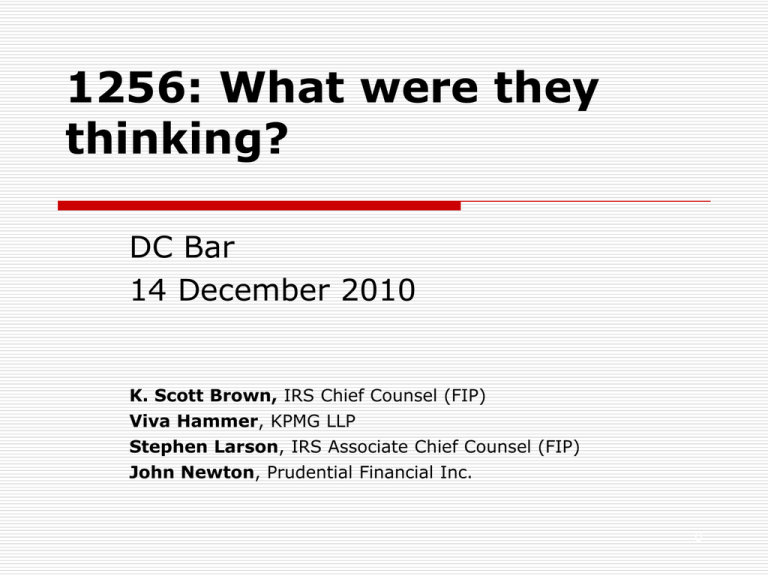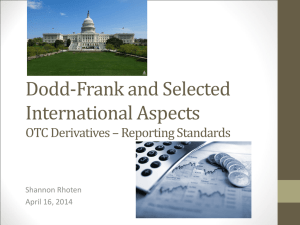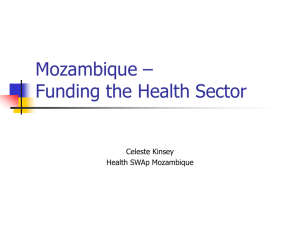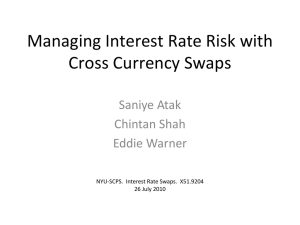2010-12 DC Bar 1256 Dodd-Frank
advertisement

1256: What were they thinking? DC Bar 14 December 2010 K. Scott Brown, IRS Chief Counsel (FIP) Viva Hammer, KPMG LLP Stephen Larson, IRS Associate Chief Counsel (FIP) John Newton, Prudential Financial Inc. 0 History of Section 1256 1970s straddle shelters Congressional hearings Treasury input 1981 compromise 1982 and subsequent amendments IRS guidance and cases Status of 1256 as part of patchwork of taxation of derivatives 1 Taxation of Derivatives (preDodd-Frank) • Over-the-counter derivatives • • • Generally realization method of accounting Mark-to-market mandated for dealers, elective for some other taxpayers Exchange-traded contracts • • • Mandatory mark-to-market and 60/40 treatment (60% LTCG/L, 40% STCG/L) Regulated futures contracts and nonequity options listed on qualified board or exchange, and foreign currency forwards QBE: designated contract market and national securities exchange Page 2 Effect of Clearing and ExchangeTrading of OTC Derivatives • Potential for section 1256 to apply to OTC derivatives that migrate onto exchanges • • • Timing (MTM) issues for some taxpayers Character (capital) issues for others Holding period benefit for others • CBO scored derivatives part of Dodd-Frank as losing $1.3 billion; estimate subject to “considerable uncertainty” Page 3 Dodd-Frank Amendment to Section 1256 • Section 1601 of Dodd-Frank amends section 1256: • The term ‘section 1256 contract’ shall not include— ‘‘(B) any interest rate swap, currency swap, basis swap, interest rate cap, interest rate floor, commodity swap, equity swap, equity index swap, credit default swap, or similar agreement.’’ • The legislative history of this amendment states: • [Title 16] also contains a provision to address the recharacterization of income as a result of increased exchangetrading of derivatives contracts by clarifying that section 1256 of the Internal Revenue Code does not apply to certain derivatives contracts transacted on exchanges. Page 4 Summary of Dodd-Frank • • • Dodd–Frank requires most “swaps” be cleared through a central counterparty (a “clearinghouse”) and traded on a regulated exchange • The term “swap” broadly defined • Includes list of 22 specific types of swaps • Excludes futures contracts • “Security-based swaps” subject to similar rules Regulated exchange means (i) designated contract market, (ii) national securities exchange, or (iii) swap execution facility End-user exception Page 5 Scope of Dodd-Frank Amendment? • • Only the 9 contracts listed (e.g., not the other 13 financial products included in the Dodd-Frank definition of “swap”) Notional principal contracts only? • • • • Compare NPC definition (Treas. Reg. §1.446-3(c)(1)(i)): • Notional principal contracts governed by this section include interest rate swaps, currency swaps, basis swaps, interest rate caps, interest rate floors, commodity swaps, equity swaps, equity index swaps, and similar agreements NPCs and other similar (non-NPC) agreements? All products classified as Dodd-Frank "swaps“? Other? Page 6 Why Scope Matters • Compare (i) interest rate swap, (ii) swap futures with similar cash flows (OMX futures contract), and (ii) swap futures with bullet cash payment (CME futures contract) • Consider hedging issues, e.g., for dealer with book including interest rate swaps, long and short positions in Treasuries, Treasury futures and options, CME swap futures, OMX swap futures, forward rate agreement and swaptions Page 7 Possibly Relevant Considerations • • Legislative history indicates intent to preserve status quo History of section 1256 • • • • • • Consistently construed by IRS to apply only to the contracts Congress had in mind Congress consistently amends section 1256 to add new contracts where broadening of scope is desired Mark D. Summitt, 134 T.C. No. 12 (May 20, 2010) (adopts narrow reading of section 1256 based on “plain meaning” interpretation) Avoidance of whipsaw/arbitrage Effect of daily MTM margin settlement for cleared contracts Need for clear rules Page 8 Regulated Futures Contacts The term “regulated futures contract” means a contract— • • (A) with respect to which the amount required to be deposited and the amount which may be withdrawn depends on a system of marking to market, and (B) which is traded on or subject to the rules of a qualified board or exchange. Page 9 Foreign Currency Contracts Foreign currency contract. The term “foreign currency contract” means a contract— • (i) which requires delivery of, or the settlement of which depends on the value of, a foreign currency which is a currency in which positions are also traded through regulated futures contracts, • (ii) which is traded in the interbank market, and • (iii) which is entered into at arm's length at a price determined by reference to the price in the interbank market. Page 10 Listed Nonequity Options Nonequity option. The term “nonequity option” means any listed option which is not an equity option. Listed option. The term “listed option” means any option (other than a right to acquire stock from the issuer) which is traded on (or subject to the rules of) a qualified board or exchange. Equity option. The term “equity option” means any option— • (A) to buy or sell stock, or • (B) the value of which is determined directly or indirectly by reference to any stock or any narrow-based security index (as defined in section 3(a)(55) of the Securities Exchange Act of 1934, as in effect on the date of the enactment of this paragraph ). Page 11 Qualified Board or Exchange The term “qualified board or exchange” means— • (A) a national securities exchange which is registered with the Securities and Exchange Commission, • (B) a domestic board of trade designated as a contract market by the Commodity Futures Trading Commission, or • (C) any other exchange, board of trade, or other market which the Secretary determines has rules adequate to carry out the purposes of this section. Page 12 Dodd-Frank Wall Street Reform and Consumer Protection Act • The term “swap” is defined broadly in Section 721(a)(21) of the Dodd-Frank Act to include: • An agreement that is commonly known (or in the future becomes commonly known) as – • an interest rate swap; • a rate floor; • a rate cap; • a rate collar; • a cross-currency rate swap; • a basis swap; • a currency swap; • a foreign exchange swap • a total return swap; • an equity index swap; Page 13 Dodd-Frank Wall Street Reform and Consumer Protection Act (cont.) • The term “swap” is defined broadly in Section 721(a)(21) of the Dodd-Frank Act to include: • an equity swap; • a debt index swap; • a debt swap; • a credit spread; • a credit default swap; • a credit swap; • a weather swap; • an energy swap; • a metal swap; • an agricultural swap; • an emissions swap; and • a commodity swap Page 14





